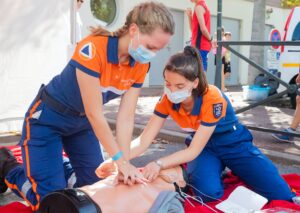Top 5 Benefits of Obtaining ACLS Certification for Healthcare Providers

For healthcare providers, staying up-to-date with certifications and skills is crucial, especially when it comes to life-saving techniques. One certification that stands out is Advanced Cardiovascular Life Support (ACLS). ACLS certification equips healthcare professionals with the knowledge and confidence to respond effectively to cardiac emergencies, which can make a significant difference in patient outcomes. In this article, we’ll explore the top 5 benefits of obtaining ACLS certification and how it enhances both professional development and patient care.
Enhanced Ability to Save Lives in Emergencies

One of the primary benefits of ACLS certification is the ability to respond confidently and effectively during life-threatening cardiac events. Whether it’s a cardiac arrest, stroke, or other cardiovascular emergency, ACLS-certified providers are trained to recognize and treat these situations using advanced techniques.
Key life-saving skills learned through ACLS certification:
- Early recognition of life-threatening conditions: ACLS teaches healthcare providers how to identify cardiac arrest, arrhythmias, and other critical conditions early, which can be crucial in saving lives.
- Effective CPR and defibrillation techniques: Knowing the proper application of CPR, defibrillation, and airway management improves survival chances for patients experiencing cardiac arrest.
- Advanced treatment protocols: ACLS certification includes administering medications, using advanced equipment, and managing post-resuscitation care, all of which can stabilize patients during emergencies.
Better Career Opportunities and Advancement
ACLS certification can significantly enhance your career prospects as a healthcare provider. Many employers, especially hospitals and emergency care settings, prefer or require ACLS certification for certain roles. By obtaining this certification, you demonstrate your commitment to patient care and your ability to handle critical situations.
Career benefits of ACLS certification:
- Competitive edge in the job market: With ACLS certification, you stand out from other candidates, giving you a better chance at landing jobs in high-demand positions like emergency care, critical care, or cardiology.
- Potential for higher pay: Many employers value ACLS-certified professionals and may offer higher compensation for those with this advanced certification.
- Qualification for specialized roles: Certain positions, such as those in ICU or emergency response teams, often require ACLS certification as a prerequisite.

Increased Confidence in Managing Critical Patients
As a healthcare provider, handling cardiac emergencies can be daunting. However, ACLS certification provides the skills and knowledge you need to approach these situations with greater confidence. The training emphasizes teamwork, communication, and critical thinking, which are essential for making fast, accurate decisions in high-pressure scenarios.
How ACLS boosts confidence:
- Clear, structured protocols: ACLS training follows well-established guidelines from the American Heart Association (AHA), helping providers make informed decisions when seconds count.
- Hands-on practice: The certification process includes practical, hands-on training that allows providers to refine their skills in simulated emergency situations, preparing them for real-life events.
- Improved teamwork skills: ACLS emphasizes effective communication and coordination with other healthcare professionals during emergencies, ensuring that the entire team can work together seamlessly.
Better Patient Outcomes and Care Quality

The ultimate goal of ACLS certification is to improve patient outcomes during cardiovascular emergencies. By equipping healthcare providers with advanced skills, ACLS training can lead to better survival rates and reduced complications for patients. When every second counts, having ACLS-certified staff on hand can make all the difference.
Positive impacts on patient care:
- Quick, accurate responses: ACLS-trained providers can quickly assess the patient’s condition and administer the appropriate interventions, improving the chances of survival and recovery.
- Efficient use of medical equipment: ACLS certification includes training on using defibrillators, administering medications, and managing airway equipment, all of which are critical in emergency situations.
- Higher standard of care: Patients receiving care from ACLS-certified professionals are more likely to benefit from timely, advanced medical interventions, leading to better outcomes.
Obtaining ACLS certification is a valuable investment for any healthcare provider. From the ability to save lives during cardiac emergencies to boosting career opportunities and improving patient outcomes, the benefits are clear. Whether you’re looking to advance in your career or simply want to ensure you’re providing the highest standard of care, ACLS …
Continue reading »

 ACLS certification is a specialized training program designed for healthcare providers who care for patients at risk of cardiac emergencies or those who have experienced cardiac arrest. It equips healthcare professionals with the advanced knowledge and skills needed to respond to complex cardiac events, such as sudden cardiac arrest, stroke, and acute coronary syndromes. Through comprehensive training and simulation exercises, ACLS certification prepares individuals to make critical decisions in high-stress situations, ultimately saving lives.
ACLS certification is a specialized training program designed for healthcare providers who care for patients at risk of cardiac emergencies or those who have experienced cardiac arrest. It equips healthcare professionals with the advanced knowledge and skills needed to respond to complex cardiac events, such as sudden cardiac arrest, stroke, and acute coronary syndromes. Through comprehensive training and simulation exercises, ACLS certification prepares individuals to make critical decisions in high-stress situations, ultimately saving lives.